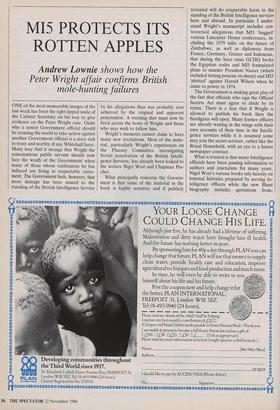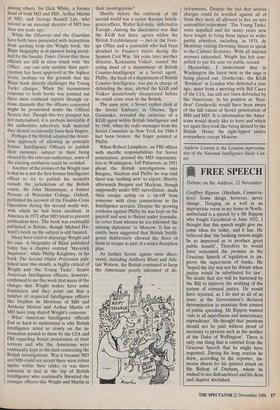MI5 PROTECTS ITS ROTTEN APPLES
Andrew Lownie shows how the
Peter Wright affair confirms British mole-hunting failures
ONE of the most memorable images of the last week has been the tight-lipped smile of the Cabinet Secretary on his way to give evidence on the Peter Wright case. Quite why a senior Government official should be crossing the world to take action against another Government official is a story rich in irony and worthy of any Whitehall farce. Many may find it strange that Wright the conscientious public servant should now face the wrath of the Government when many of those whose confessions he has induced are living in respectable retire- ment. The Government feels, however, that more damage has been caused to the standing of the British Intelligence Service by his allegations than was probably ever achieved by the original and apparent penetration. A warning shot must now be fired across the bows of Wright and those who may wish to follow him.
Wright's memoirs cannot claim to have many new revelations. Most of the mate- rial, particularly Wright's experiences on the Fluency Committee investigating Soviet penetration of the British Intelli- gence Services, has already been leaked to the writers Nigel West and Chapman Pin- cher.
What principally concerns the Govern- ment is that some of the material in the book is highly sensitive and if publicly revealed will do irreparable harm to the standing of the British Intelligence services here and abroad. In particular I under- stand Wright's manuscript includes con- troversial allegations that MI5 'bugged' various Lancaster House conferences, in- cluding the 1979 talks on the future of Zimbabwe, as well as diplomats from France, Germany, Greece and Indonesia, that during the Suez crisis GCHQ broke the Egyptian codes and MI5 formulated plans to murder President Nasser (which included testing poisons on sheep) and MI5 `plotted' against Harold Wilson when he came to power in 1974.
The Government is making great play of the fact that officials who sign the Official Secrets Act must agree to abide by its terms. There is a fear that if Wright is allowed to publish his book then the floodgates will open. Many former officers are already waiting in the wings with their own accounts of their time in the Intelli- gence services while it is assumed some may join the secret services, rather like the Royal Household, with an eye to a future newspaper contract.
What is ironical is that many Intelligence officials have been passing information to authors and journalists for many years. Nigel West's various books rely heavily on internal histories prepared by serving In- telligence officers while the new Blunt biography includes quotations from, among others, Sir Dick White, a former head of both MI5 and MI6, Arthur Martin of MI5, and George Russell Lee, who retired as an assistant director of MI5 less than ten years ago.
While the Observer and the Guardian have both been prevented with injunctions from quoting from the Wright book, the Blunt biography is at present being serial- ised by the Sunday Times. Given that these officers are still in close touch with 'the Office', one can only surmise their parti- cipation has been approved at the highest levels, perhaps on the grounds that the Blunt book directly challenges the Young Turks' charges. When the inconsistent response to both books was pointed out there were confused reports through va- rious channels that the officers concerned might be prosecuted under the Official Secrets Act. Though this wry prospect has not materialised, it is perhaps inevitable if the authorities selectively leak material they should occasionally burn their fingers.
Perhaps if the British adopted the Amer- ican approach of allowing in principle former Intelligence Officers to publish their memoirs, subject to their being cleared by the relevant authorities, some of the existing confusion could be avoided.
Another of the ironies of the Wright case is that he is not the first former Intelligence officer to try to publish his memoirs outside the jurisdiction of the British courts. Sir John Masterman, a former Provost of Worcester College, Oxford, published his account of the Double-Cross Operation during the second world war, with which he had been involved, in America in 1972 after MI5 tried to prevent publication here. The book was eventually published in Britain, though Michael Ho- ward's book on the subject is still banned.
Many have tried to disparage Wright and his case. A biography of Blunt published today has a chapter entitled 'Maverick Inquisitor', while Phillip Knightley, in his book The Second Oldest Profession pub- lished later this month, is highly critical of Wright and 'the Young Turks'. Senior American Intelligence officers, however, confirmed to me this week that many of the charges that Wright makes have some foundation and they point out that a number of respected Intelligence officers like Stephen de Mowbray of MI6 and Anthony Motion and Arthur Martin of MIS have long shared Wright's concerns.
What American Intelligence officials find so hard to understand is why British Intelligence acted so slowly on the in- formation passed to them by the CIA and FBI regarding Soviet penetration of their services and why the Americans were continually kept in the dark concerning the British investigations. Was it because MI5 and MI6 could not accept there were rotten apples within their ranks, or was there someone in fact at the top of British Intelligence who continually thwarted the younger officers like Wright and Martin in their investigations?
Shortly before the outbreak of the second world war a senior Russian Intelli- gence officer, Walter Krivitsky, defected in Europe. Among his disclosures was that the KGB had three agents within the British Establishment — two in the Fore- ign Office and a journalist who had been attached to Franco's forces during the Spanish Civil War. Six years later another defector, Konstantin Volkov, named 'the acting head of a department of British Counter-Intelligence' as a Soviet agent. Philby, the head of a department of British Counter-Intelligence, was put in charge of debriefing the man, alerted the KGB and Volkov mysteriously disappeared before he could come over to the British.
The same year, a Soviet cypher clerk at the Soviet Embassy in Ottawa, Igor Gouzenko, revealed the existence of a KGB agent within British Intelligence and by 1948, when the radio messages from the Soviet Consulate in New York for 1944-5 had been broken, the finger pointed at Philby.
When Robert Lamphere, an FBI officer with specific responsibilities for Soviet penetration, pressed the MI5 representa- tive in Washington, Jeff Patterson, in 1951 about the British investigations into Burgess, Maclean and Philby he was told there was 'nothing new' to report. Shortly afterwards Burgess and Maclean, though supposedly under MIS surveillance, made their escape acting on a tip-off from someone with close connections in the Intelligence services. Despite the growing evidence against Philby he was kept on the payroll and sent to Beirut under journalis- tic cover from whence he too followed 'the missing diplomats' to Moscow. It has re- cently been suggested that British Intelli- gence deliberately allowed the three of them to escape as part of a wider deception plan.
As further Soviet agents were disco- vered, including Anthony Blunt and Alis- tair Watson, the British continued to keep the Americans poorly informed of de- velopments. Despite the fact that serious charges could be levelled against all of them they were all allowed to live on into untroubled retirement. 'The Young Turks' were appalled and for many years now have fought to bring these lapses to wider public attention, including, in 1974, de Mowbray visiting Downing Street to speak to the Cabinet Secretary. With all internal avenues exhausted, Wright has felt com- pelled to put his case on public record.
Meanwhile, I understand that in Washington the latest twist in the saga is being played out. Gordievski, the KGB 'Resident' in London who defected a year ago, apart from a meeting with Bill Casey of the CIA, has still not been debriefed by the Americans. In his position as 'Resi- dent' Gordievski would have been aware of the full extent of Soviet penetration of MI6 and MI5. It is information the Amer- icans would dearly like to have and which yet again they look like being denied by the British. Hence the tight-lipped smiles everywhere except Moscow.
Andrew Lownie is the London representa- tive of the National Intelligence Study Cen- tre.



























































 Previous page
Previous page